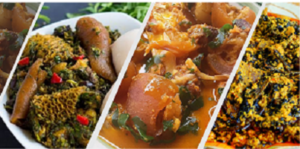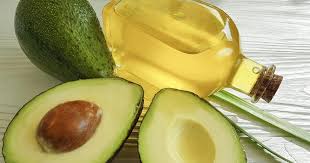Conquer Weeknight Chaos with 10 One-Pot Nigerian Feasts in Minutes!
The allure of takeout menus on weeknights is undeniable.
But who has the time (or energy) to wrestle with dishes after a long day? Fret not, weary home cooks!
This is your battle cry against weeknight chaos, armed with 10 Nigerian-inspired one-pot wonders that are bursting with flavor, ready in minutes, and require minimal cleanup.
No, these aren’t just any one-pot wonders. We’re talking culinary symphonies infused with vibrant spices, fresh ingredients, and the bold soul of Nigerian cuisine.
Imagine aromatic jollof rice bubbling away, spicy suya skewers nestled on creamy peanut sauce, or a hearty egusi stew simmering with okra and leafy greens.
These are masterpieces that deliver maximum satisfaction with minimal effort, leaving you more time to unwind and less time battling mountains of dirty dishes.
But this isn’t just about convenience. It’s about celebrating the magic of Nigerian food, its ability to weave familiar comfort with exotic bursts of flavor.
It’s about bringing families and friends together around a shared pot, where laughter bubbles as readily as the stew itself.
It’s about reclaiming your weeknights from the tyranny of takeout and rediscovering the joy of cooking, even when time is tight.
So, ditch the delivery app and grab your trusty pot, because we’re about to embark on a culinary adventure unlike any other.
Get ready to conquer weeknight chaos with these 10 Nigerian-inspired one-pot wonders that are guaranteed to tantalize your taste buds and warm your soul:
In the whirlwind of weeknight chaos, the quest for quick, satisfying dinners is universal. Imagine infusing the vibrant flavors of Nigeria into your evening meals, all in one pot, and all ready in minutes.
Welcome to our culinary adventure: One-Pot Dinners That Conquer Weeknight Chaos: 10 Nigerian-Inspired Meals Ready in Minutes. This isn’t just about cooking; it’s about transforming your weeknight dinners into an effortless, flavor-packed journey.
Nigerian cuisine, renowned for its bold spices and hearty ingredients, provides the perfect blueprint for one-pot wonders.
Whether you’re a fan of rich stews, aromatic rice dishes, or veggie-packed soups, this guide has something for everyone. We understand the need for simplicity in the kitchen, especially after a long day.
That’s why each recipe in this collection has been crafted with ease and speed in mind, without sacrificing taste or nutritional value.
Join us as we delve into the world of Nigerian-inspired cuisine, where convenience meets flavor.
These recipes are more than just quick fixes; they’re a celebration of culture and taste, tailored to fit into your busy schedule.
So, grab your pot and let’s get cooking, as we bring the essence of Nigerian kitchens into your home, one delicious meal at a time.
The Beauty of One-Pot Cooking
Understanding the Convenience
One-pot cooking is a lifesaver for busy individuals. The primary advantage is the minimal cleanup required – one pot means less washing up.
This cooking method also allows flavors to meld beautifully as ingredients cook together, creating a depth of flavor that’s hard to achieve with separate cooking methods.
It’s economical too, both in terms of energy usage and ingredient utilization.
The History of One-Pot Meals in Nigerian Cuisine
One-pot meals have a special place in Nigerian culinary history.
Dishes like Jollof Rice, Egusi Soup, and Pottage are steeped in tradition, each telling a story of cultural heritage and communal living.
These dishes were not just about feeding a family efficiently; they were about bringing people together, sharing stories, and preserving a rich cultural identity.
Essential Nigerian Spices and Ingredients

Building a Nigerian Flavor Profile
Nigerian cuisine is known for its robust flavors, achieved through a blend of spices and ingredients unique to the region. Staples include:
- Red palm oil: A must-have for authentic taste and color.
- Ground crayfish: Adds a depth of flavor to soups and stews.
- Scotch bonnet peppers: Provides heat and spice.
- Dried smoked fish: Infuses a smoky, umami flavor.
Must-Have Spices for Authentic Taste
To truly capture the essence of Nigerian cooking, your spice rack should include:
- Jollof seasoning: A blend perfect for rice dishes.
- Curry powder: Adds complexity to stews and soups.
- Thyme and bay leaves: Common in many savory dishes.
- Maggi or Knorr cubes: Used widely to enhance flavor.
Jollof Rice: The One-Pot Wonder

The Classic Recipe Ingredients:
- 2 cups long-grain parboiled rice
- 1/4 cup red palm oil
- 1 onion, finely chopped
- 1 can tomato paste (6 oz)
- 2 fresh tomatoes, blended
- 1 red bell pepper, blended
- 2 teaspoons Jollof seasoning
- 1 teaspoon curry powder
- 1 Scotch bonnet pepper, finely chopped (optional)
- 3 cups chicken or vegetable broth
- Salt to taste
Instructions:
- Rinse the rice until water runs clear, drain and set aside.
- In a large pot, heat the palm oil over medium heat. Add chopped onions and fry until translucent.
- Stir in the tomato paste and cook for 2 minutes. Add the blended tomatoes and bell pepper, cooking for another 10 minutes until the mixture thickens.
- Add the Jollof seasoning, curry powder, and Scotch bonnet pepper. Stir well.
- Pour in the broth, bring to a boil. Add the rice, reduce heat, cover, and simmer for 30 minutes or until the rice is cooked and liquid is absorbed.
- Adjust seasoning, fluff with a fork, and serve.
Variations for Every Taste
- Vegetarian Jollof Rice: Replace chicken broth with vegetable broth and add a variety of vegetables like carrots, peas, and green beans.
- Seafood Jollof: Add shrimp or fish during the last 10 minutes of cooking.
- Coconut Jollof Rice: Substitute half of the broth with coconut milk for a creamy twist.
Hearty Nigerian Stews

Meat and Vegetable Options
Nigerian stews often feature meats like goat, chicken, or beef, and are richly flavored with spices. Vegetable stews often use leafy greens such as spinach or bitter leaf and are thickened with ground seeds like melon (egusi) or pumpkin.
Tips for Rich Flavors in Less Time
- Use pre-ground spices to save on preparation time.
- For meat stews, consider using a pressure cooker to reduce cooking time.
Nigerian-Inspired Pasta Dishes

Fusion Recipes for Quick Weeknight Meals
Incorporating Nigerian flavors into pasta creates a delightful fusion. These recipes are perfect for a change of pace on a busy weeknight, offering both comfort and a taste of Nigeria’s vibrant culinary culture.
Suya Spaghetti
Ingredients:
- 500g spaghetti
- 200g beef or chicken, thinly sliced
- 2 tablespoons suya spice
- 1 large onion, sliced
- 1 bell pepper, sliced
- 2 tablespoons vegetable oil
- Salt to taste
Instructions:
- Cook the spaghetti according to package instructions, drain and set aside.
- Season the meat with suya spice and a pinch of salt.
- In a pan, heat the oil and fry the meat until just cooked. Remove and set aside.
- In the same pan, sauté onions and bell peppers until soft.
- Add the cooked meat back to the pan, mix with the vegetables.
- Toss the spaghetti with the suya meat and vegetables. Serve hot.
Vegetarian Pepper Pasta
Ingredients:
- 500g penne pasta
- 1 large onion, chopped
- 2 bell peppers, sliced
- 3 tomatoes, blended
- 2 teaspoons Nigerian curry powder
- 1 teaspoon dried thyme
- 1/4 cup red palm oil
- Salt and pepper to taste
Instructions:
- Cook pasta as per package instructions; drain.
- Heat palm oil in a pan. Fry onions until translucent.
- Add bell peppers, cook for 3 minutes.
- Stir in blended tomatoes, curry powder, thyme, salt, and pepper. Simmer for 10 minutes.
- Mix the sauce with the cooked pasta. Adjust seasoning and serve.
Healthy Nigerian Soups

Nutritious and Filling Choices
Nigerian soups are a powerhouse of nutrition, often loaded with vegetables, meats, and legumes. They are an integral part of the Nigerian diet and can be tailored to suit various dietary needs.
Egusi Soup
Ingredients:
- 2 cups ground Egusi (melon seeds)
- 500g spinach, chopped
- 300g beef, cut into chunks
- 2 tablespoons palm oil
- 1 onion, chopped
- 3 cups meat stock
- 2 tablespoons ground crayfish
- 1 teaspoon Nigerian curry powder
- Salt and pepper to taste
Instructions:
- In a pot, heat the palm oil and fry the onions until soft.
- Add the beef and brown all over.
- Pour in the meat stock, bring to a boil and cook until the meat is tender.
- Stir in the ground egusi and simmer until it thickens.
- Add the spinach, crayfish, curry powder, salt, and pepper. Cook for another 5 minutes.
- Serve hot with pounded yam or fufu.
Seafood Delights: Nigerian Style

Simple Yet Flavorful Seafood Recipes
The coastal regions of Nigeria offer a bounty of seafood that is used in various dishes. These recipes bring the freshness and flavor of Nigerian seafood to your dinner table.
Grilled Tilapia
Ingredients:
- 4 tilapia fillets
- 2 tablespoons suya spice
- 1 lemon, juiced
- 2 tablespoons vegetable oil
- Salt to taste
Instructions:
- Preheat your grill to medium-high.
- Season the tilapia fillets with suya spice, lemon juice, oil, and salt.
- Grill each side for 4-5 minutes or until the fish is cooked through.
- Serve hot with a side of Jollof rice.



















Leave a Reply